This piece provides an overview and high level analysis of the publications compiled on this platform at its launch. It is important to note that the analysis and conclusions are drawn from the classification done of recent publications (since 2015) by a sample of 34 credible international institutions (think tanks, research institutes, human rights organizations, specialized forums and outlets) who do research on Egypt and Middle East. The website profiles and lists 58 institutions who have the same focus. The international think tanks are from diverse regions; North America, Europe, Middle East and Asia. However, the research was based on publications published in English.
The publications are classified into broad categories of democracy & politics, economy, human rights, military affairs, security & counter-terrorism and foreign relations. Additional more specialized categories are also provided for the research on Egypt classifying them further under culture, education & development, women affairs, Islamic movements & institutions, civil society, media, youth, and Sinai.
The primary analysis based on the above classification of the 540 publications produced by 34 institutions since 2015 shows some interesting trends.
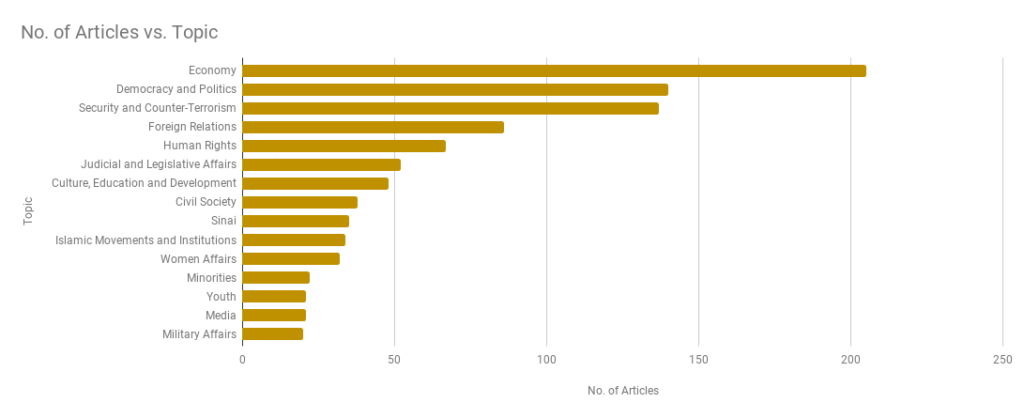
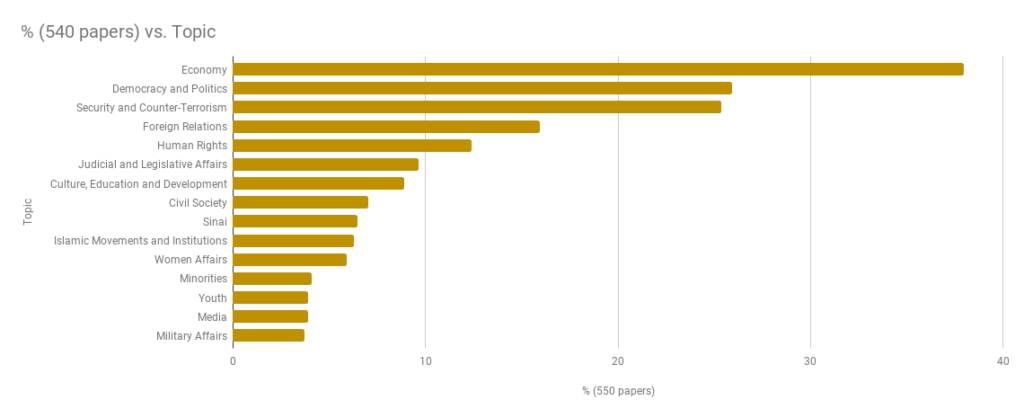
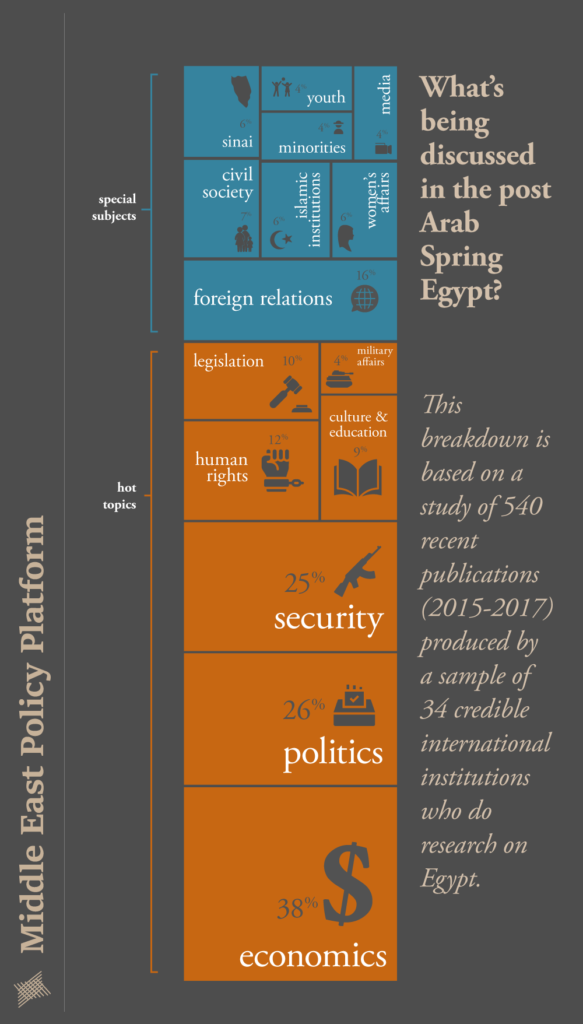 The above bar graphs show that the primary research interests collectively since 2015 is focused on the economy (38%), democracy & politics (26%), security and counter terrorism (25%), and foreign relations (16%). This highlights the international research interest in Egypt 4 years after the January 2011 revolution / uprising and 2 years after the military take over is focused on the health of the state; the economy, the political landscape and the level of security. These areas along with human rights (12%) are the primary dimensions that influence Egypt’s foreign relations as expressed in bilateral relations, foreign aid / investments, and regional politics.
The above bar graphs show that the primary research interests collectively since 2015 is focused on the economy (38%), democracy & politics (26%), security and counter terrorism (25%), and foreign relations (16%). This highlights the international research interest in Egypt 4 years after the January 2011 revolution / uprising and 2 years after the military take over is focused on the health of the state; the economy, the political landscape and the level of security. These areas along with human rights (12%) are the primary dimensions that influence Egypt’s foreign relations as expressed in bilateral relations, foreign aid / investments, and regional politics.
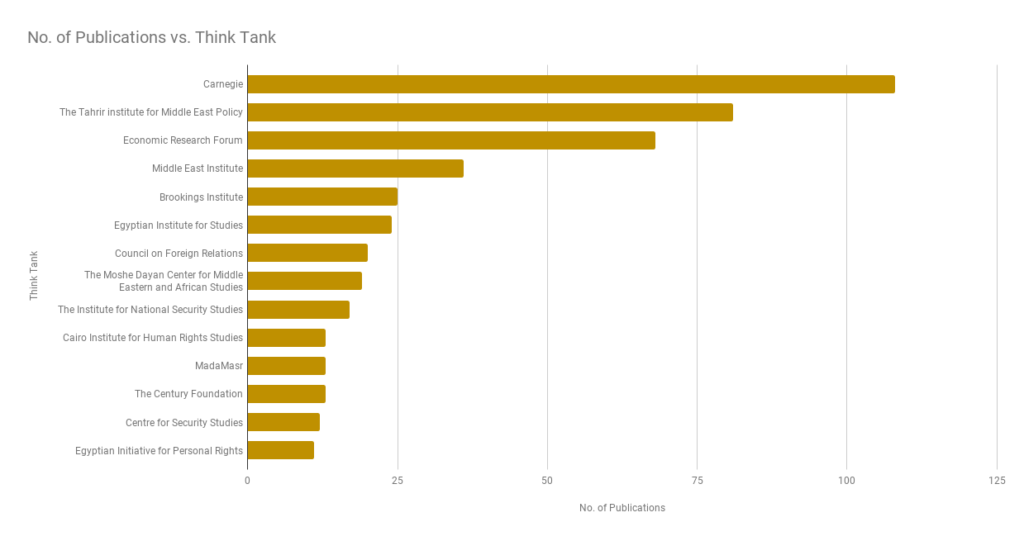
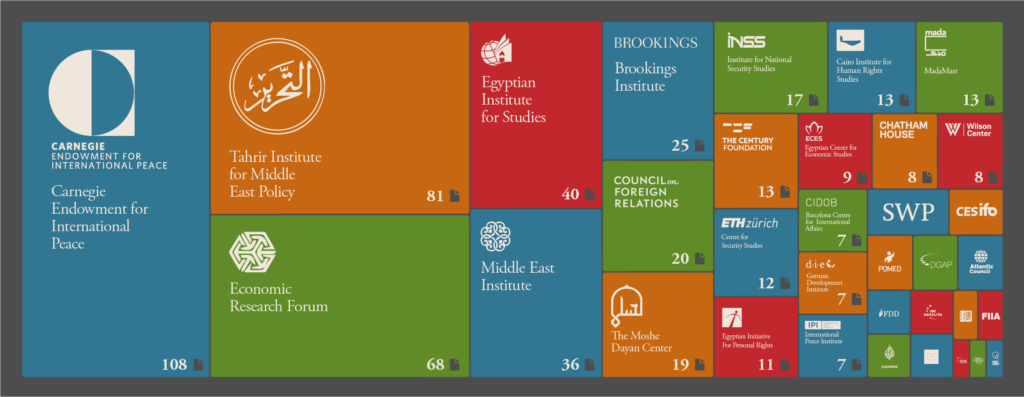
The above graph shows the most active institutions publishing on Egypt. The most active collectively since 2015 are; Carnegie Endowment for International Peace (108), The Tahrir Institute for Middle East Policy (81), and the Economic Research Forum (68).

This chart shows the number of publications published per year for each category/ topic. In 2017 the topics most researched areas are economy, democracy/politics, security, foreign relations and human rights. Egypt’s economy has been consistently the primary research focus on Egypt over the three years.
Post military take over in July 2013 up until 2015 witnessed a focus on Islamic Movements and Institutions, but then there seems to be a significant drop in resources dedicated to this area of study.
There has been an increasing focus on judicial affairs in Egypt since 2015 with almost a 100% increase in research due to the mass trials on one end but more importantly due to the institutional and legislative changes directly influencing judicial independence especially after the Tiran and Sanafir dispute between the judiciary and the legislative assembly.
Very little focus has been given to studying the media in Egypt over the last three years even though media is a major internal factor that influences decision makers and is a primary fuel to polarization and social tension that could potentially contribute to further instability.
Security and counter-terrorism has seen a spike in the last two years consistent with the instability and terrorist operations seen in the country.
The areas of Women affairs, Youth and Minorities has has limited and minimal research throughout the three years.
The study of civil society has increased primarily due to limitations put on civil society by the new NGO legislation and the crackdown on civil society organizations via assets freezing and prevention of travel.
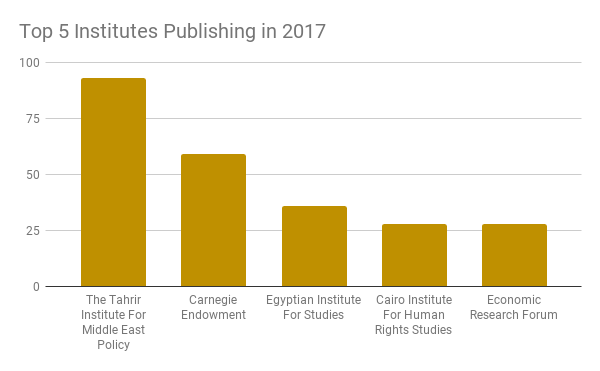
This chart shows the top 5 institutes publishing on Egypt. It shows that more specialized and Egypt focused institutes went up to the top list. Specific focus on human rights, economy and policy research became more common.
In conclusion, as clear in the above analysis, a holistic view of research done on Egypt over the past 3 years from a significant sample of professional research institutions focusing on Egypt and the Middle East gives perspective to the growing trends of interest and importance to decision makers. MEPP will continue to track and analyze active research on Egypt with this wide and objective lense to help researchers and decisions makers have quick access and overview.
